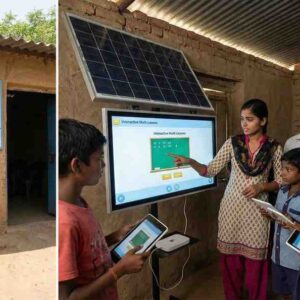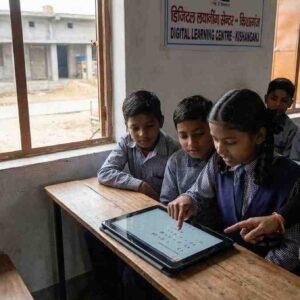New Delhi, India, 2025— Democracies, celebrated for their emphasis on freedom, equality, and representation, are not immune to collapse. From political instability to economic inequality and the rise of authoritarianism, various factors have contributed to the downfall of democracies worldwide. These failures offer crucial lessons for nations, including India, to safeguard their democratic frameworks against similar risks.
This article examines key case studies of failed democracies and explores their implications for India, drawing parallels and identifying preventive measures.
1. Weimar Republic (Germany, 1919–1933): Economic Crises and Political Polarization
The Weimar Republic, established after World War I, faced economic instability, political extremism, and weak institutional structures.
- Causes of Failure:
- Hyperinflation and economic hardship eroded public trust in democratic governance.
- The rise of extremist parties like the Nazis exploited public discontent.
- Lesson for India: Economic inequality and political polarization can destabilize democracies.
- Fact: India’s wealth disparity is significant, with the top 1% controlling 40.5% of wealth (Oxfam India, 2023). Addressing economic inequalities is crucial to maintaining public trust.
2. Chile (1970–1973): Political Instability and External Interference
The democratic government of Salvador Allende faced a military coup in 1973, marking the end of Chile’s democracy.
- Causes of Failure:
- Deep political divides and lack of consensus on economic policies.
- External interference, particularly by the U.S., exacerbated instability.
- Lesson for India: Political consensus and safeguarding sovereignty are essential for democratic survival.
- Example: India’s polarized political landscape, with communal rhetoric and divisive campaigns (Election Commission of India, 2025), requires efforts to build bipartisan cooperation.
3. Venezuela (1999–Present): Erosion of Institutions and Economic Collapse
Once a thriving democracy, Venezuela succumbed to authoritarianism under Hugo Chávez and Nicolás Maduro.
- Causes of Failure:
- Concentration of power in the executive branch and dismantling of democratic institutions.
- Mismanagement of natural resources, leading to economic collapse.
- Lesson for India: Strong institutions and balanced governance are critical.
- Fact: Reports of executive interference in India’s judiciary (PRS Legislative Research, 2024) highlight the need to uphold institutional independence.
4. Turkey (Post-2017): Democratic Backsliding
Turkey transitioned from a parliamentary democracy to a presidential system, centralizing power in the hands of Recep Tayyip Erdoğan.
- Causes of Failure:
- Curtailing press freedom and opposition voices.
- Concentration of power and weakening of checks and balances.
- Lesson for India: Ensuring press freedom and opposition strength is vital.
- Fact: India ranks 150th in the World Press Freedom Index (2024), highlighting the importance of safeguarding journalistic independence.
5. Myanmar (2021–Present): Military Intervention
Myanmar’s military coup in 2021 ended a brief period of democratic governance, plunging the nation into turmoil.
- Causes of Failure:
- Weak democratic institutions unable to resist military interference.
- Lack of accountability mechanisms.
- Lesson for India: Strengthening democratic institutions and preventing undue interference by non-elected entities is essential.
Implications for India
1. Addressing Economic Inequality
- Economic disparity undermines public trust in governance, as seen in Germany and Venezuela.
- Solution: Expand welfare programs like MGNREGA and increase funding for education and healthcare.
2. Strengthening Institutions
- Institutional independence safeguards democracy, as highlighted by the failures in Venezuela and Turkey.
- Solution: Transparent judicial appointments and empowering bodies like the Election Commission of India.
3. Safeguarding Press Freedom
- A free press prevents authoritarian tendencies, as shown by Turkey’s democratic decline.
- Solution: Fast-track the Journalist Protection Bill to ensure media independence.
4. Fostering Political Cooperation
- Bipartisan efforts can mitigate polarization, as evident from Chile’s experience.
- Solution: Establish platforms for inter-party dialogue to address shared national challenges.
Global Lessons for India’s Democracy
1. Scandinavian Model
- Countries like Sweden demonstrate the importance of robust welfare systems and political consensus.
- Takeaway: Strengthen grassroots participation and ensure equitable resource distribution.
2. The U.S. and Electoral Reforms
- Efforts to regulate campaign financing and counter voter suppression in the U.S. provide insights.
- Takeaway: Cap corporate political donations to reduce undue influence.
3. South Africa’s Fight Against Corruption
- Institutional reforms post-apartheid show the value of anti-corruption measures.
- Takeaway: Enhance transparency and accountability mechanisms in governance.
Conclusion: Democracy’s Fragility and Resilience
The failure of democracies worldwide underscores the need for vigilance, robust institutions, and inclusive governance. For India, safeguarding its democratic framework requires addressing economic disparities, protecting civil liberties, and fostering political cooperation.
By learning from global failures and reinforcing its democratic ideals, India can ensure that its democracy not only survives but thrives in the face of emerging challenges.










